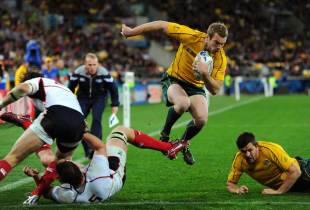|
Comment
Up to the task?
Keiran Smith
September 26, 2011

The Wallabies got back to winning ways against the US but lost a number of players to injury in the process
© Getty Images
Enlarge
A week can be an eternity in a Rugby World Cup. Going into the Ireland game on the back of an explosive second-half thrashing of Italy, the Wallabies looked ready to show their credentials against their only meaningful opposition for top spot in Pool C. But, as in Marseille in 2007, those canny northern hemisphere forwards again showed up the Wallabies' frailties and plunged the Aussies into sudden-death rugby two weeks early. While finding a silver lining from a pretty ordinary performance was difficult, the good news was that the squad had few injuries compared to others. After watching Andrew Sheridan (England), David Skrela (France) and Gonzalo Tiesi (Argentina) fall to tournament-ending injuries, the Wallabies squad's depth looked relatively intact having only lost Digby Ioane and David Pocock to minor complaints in the early rounds. With a mountain ahead of them, the Wallabies restored their wounded pride against a USA team that had made 14 changes to their team from their previous outing. It's fair to say USA coach Eddie O'Sullivan knew his squad was going to feel the wrath of a team burning to rebuild their campaign. And he wasn't wrong. The Wallabies started slowly, but once in gear ran in four first half tries, including one of the best tries of the tournament when Kurtley Beale touched down after Rocky Elsom and Adam Ashley Cooper had launched a counterattack from the Wallabies own goal line. The onslaught in the second half was even more impressive, with Ashley-Cooper running amok in the backline and Berrick Barnes returning to the Test arena as if he'd never been away. So pride in the Wallabies jersey has been restored. But at what cost? That's what Robbie Deans must have thought standing in a dressing room resembling a military field hospital. Given the number of casualties it would not have been surprising to see 'Hawkeye' and 'Hot Lips Houlihan' dressing the wounds of at least half of the starting XV. The Wallabies depth in midfield was decimated in just over an hour with Anthony Fainga'a (concussion), Rob Horne (fractured cheek) and Pat McCabe (dislocated shoulder) all in doubt to play before the quarter finals, if at all. Also on the treatment table are Wycliff Palu (hamstring) Beale (groin) and Ashley-Cooper (ankle), although both are expected to be fit for Russia. Horne and Palu will undergo scans this week to determine the extent of their injuries and whether replacements need to be parachuted in from home. For the desperately unlucky Horne, this is thought likely. Robbie Deans does have some choices if a replacement is needed. Matt Giteau could receive a surprise SOS call, but young QLD Reds centre Ben Tapuai is tipped as the frontrunner as a midfield replacement, after a strong performance for the Australian Barbarians against Canada before the tournament. As a hard running centre he is also more of a like-for-like replacement than the ball-playing Giteau. Deans may opt to replace Horne with a specialised No.7, given Pocock's back strain has proven more problematic than first expected and has left a massive hole in the Wallabies forward pack. The lack of a skilled poacher was a key contributor to the loss against the Irish and the Wallabies will need a specialist in that position for the quarterfinals. The likely contenders are Matt Hodgson (Western Force) and Beau Robinson (Reds) but a fair question would be why wasn't a second specialised openside flanker selected in the original 30-man squad? With so few fit backline players to choose from for Russia on Saturday, the Wallabies will likely pick Quade Cooper alongside Barnes in midfield, Ashley Cooper at outside centre, Drew Mitchell and James O'Connor on the wings and Beale at fullback. This is arguably the best backline the Wallabies can field and the presence of Barnes will make the Wallabies more dangerous as Cooper won't be the focal point of each and every attack. Seeing Barnes convert 80% of his goal kicks is another welcome relief for the Wallabies in a tournament where goal-kicking has been poor. Regardless of the try-scoring potential of this Wallabies team, the knockout rounds will be won by the teams that take their chances from kicks. A lesson the Wallabies learned the hard way in 2007. But first the Wallabies must deal with Russia and, more importantly, get through the game unscathed. In a tournament that has shown the tier two nations proving more than a handful for the established rugby nations, Australia will want to put in a strong performance to lift morale before lining up (most probably) against world champions South Africa in Wellington next weekend, with the All Blacks looming large on the horizon as a likely semi-final opponent. If it's a challenge the Wallabies wanted at this World Cup, they certainly have one now. © ESPN Sports Media Ltd.
|
Live Sports
Communication error please reload the page.
-
Football
-
Cricket
-
Rugby
-
- Days
- Hrs
- Mins
- Secs
F1 - Abu Dhabi GP
Abu Dhabi Grand Prix December 11-131. Max Verstappen ()
2. Valtteri Bottas (Mercedes)
3. Lewis Hamilton (Mercedes)
4. Alexander Albon ()
5. Lando Norris ()
6. Carlos Sainz Jr ()
-
ESPNOtherLive >>
Golf - Houston Open
Snooker - China Open
Tennis - Miami Open

